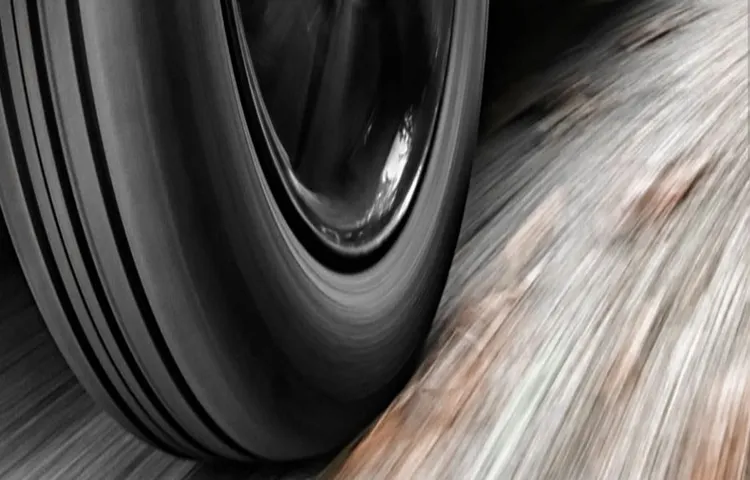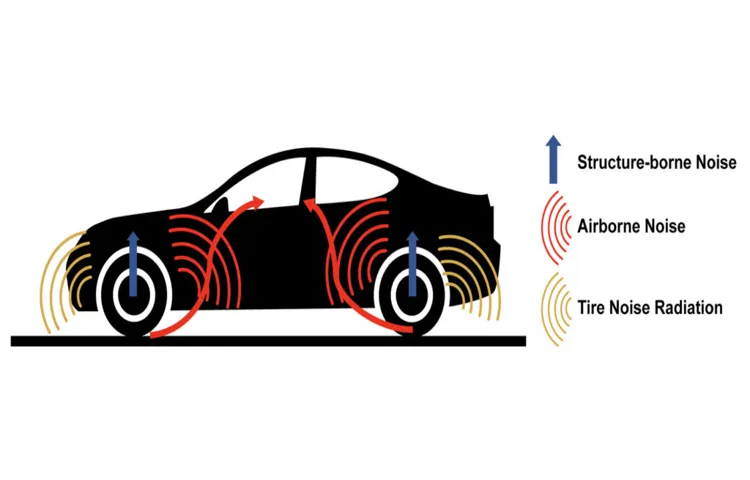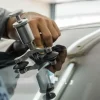Have you ever turned your car and heard an odd noise coming from your tires? It’s not a pleasant sound and can be quite alarming. But why is your tire making noise when turning? Well, there are several possible reasons, and we’re here to guide you through them. It could be something as simple as low tire pressure or something more serious, like a worn-out ball joint.
In this blog, we’ll explore the common causes of tire noise while turning and provide you with some solutions that will keep your vehicle running smoothly. So, buckle up, and let’s get started!
Table of Contents
Possible Causes of Tire Noise While Turning
Tire noise when turning can be frustrating and even alarming, but it’s a common problem that has several possible causes. One reason why your tire might be making noise is due to an alignment issue. If your wheels aren’t properly aligned, it can cause uneven tire wear, resulting in a thumping or grinding sound when turning.
Another potential culprit could be a failing wheel bearing, which can cause a whirring or humming noise. It’s also possible that your tires themselves are to blame. If you have low tire pressure or a damaged tire, it can cause vibrations and noisy turning.
Finally, the type of tires you’re using may be contributing to the sound as well. Tires with a more aggressive tread pattern tend to be noisier than those with a smoother tread. If you’re experiencing tire noise when turning, it’s important to have a professional inspect your vehicle to determine the cause and address any necessary repairs.
Low tire pressure
Low tire pressure can cause various types of tire noise, including a low humming or rumbling sound when turning. This may occur because insufficient tire pressure reduces the contact patch of the tire with the road, leading to increased friction and noise generation. In addition, low tire pressure can cause premature tire wear and even result in a blowout, which can be dangerous.
Other possible causes of tire noise while turning include misaligned wheels, damaged suspension components, worn-out tires, and uneven tire wear. It is essential to regularly check tire pressure levels to ensure optimal performance and safety of your vehicle. If you hear unusual tire noise, it is best to have a professional mechanic inspect your tires to identify any underlying issues and prevent more extensive damage in the future.

Worn out wheel bearings
If you’ve noticed your tires making noise while turning, worn-out wheel bearings could be a possible cause. These bearings support the weight of your vehicle while allowing your wheels to spin freely, and over time, they can become damaged and wear out. As a result, you might hear a loud humming or growling noise coming from the affected wheel while turning.
Other signs of worn-out bearings may include uneven tire wear, vibration, and steering instability. If you suspect your wheel bearings are the culprit behind your tire noise, it’s important to have them inspected and replaced by a professional mechanic to prevent any further damage to your vehicle. Don’t hesitate to get your car checked out if you suspect any issues, as neglecting problems with your wheel bearings can lead to unsafe driving conditions and expensive repairs down the road.
Uneven tire wear or alignment issues
Tire noise while turning can be an annoying problem to deal with while driving. One of the possible causes of this issue is uneven tire wear or alignment problems. If your tires are not wearing evenly, it causes them to produce unwanted noise while turning.
It could be due to improper tire inflation, alignment issues, or even worn out suspension components. Over time, these issues can cause significant damage to your vehicle and reduce your safety on the road. Therefore, it’s essential to address tire noise as soon as possible to prevent further harm.
A simple solution is to get your tires and alignment checked by a professional mechanic regularly. They can ensure that your tires are in good condition, properly inflated, and aligned, providing you with a peaceful and smooth driving experience. Don’t ignore tire noise while turning, as it can lead to severe consequences, including accidents, costly repairs, and even road mishaps.
Damaged steering or suspension components
Tire noise while turning can be a disconcerting experience for any driver. One of the possible causes of such noise is a damaged steering or suspension component. In most cases, worn-out tie rod ends, ball joints, or bearings can cause the tires to produce a scraping, clicking, or grinding noise while turning.
If you hear a clunking sound while driving over bumps or making turns, this could be an indication that a component in the steering or suspension system is failing. A faulty strut mount or strut bearing can also cause steering wheel vibration along with noise, making it difficult to control the vehicle. It’s essential to get your vehicle inspected by a professional mechanic as soon as possible to assess the cause of the noise before it leads to any significant damage or safety concerns.
Remember, timely maintenance and repair can save you from costly repairs and ensure your safety on the road.
How to Diagnose Tire Noise When Turning
If you’ve noticed that your tire makes noise when turning, it’s important to diagnose the issue in order to ensure your safety on the road. One possible cause of tire noise when turning is worn-out wheel bearings. If your wheel bearings are wearing out, you may notice a grinding, buzzing, or humming noise while turning.
Additionally, if your tires are not properly inflated or balanced, they can create noise while turning. Uneven wear on the tires can also cause noise, especially if it’s accompanied by vibration. To diagnose the issue, take your car to a mechanic who can examine the tires and wheel bearings.
They can determine if the issue is the tires or if it’s something more serious, and can advise you on the best course of action to take. Ultimately, it’s important to address any strange noises or vibrations coming from your car, as they can ultimately lead to more serious issues if left untreated.
Inspect the tires
When you’re hearing strange noises while turning your vehicle, it’s essential to diagnose the issue before it becomes severe. One of the most common reasons for noise in your tires when turning is uneven tire wear. Inspect the tires to check for inconsistent wear patterns.
If you see that there’s more wear on one side of the tire than the others, you might need a wheel alignment. Uneven wear affects the suspension and steering components, which can lead to increased tire noise and premature wear. It’s also essential to check if there are any foreign objects lodged in the tread.
Small rocks or debris can cause a severe imbalance in the weight distribution of the tire, leading to unusual noises. Using tire cleaner and a brush to clean the treads to remove any dust or debris is a necessary step in diagnosing the root cause of tire noise. Addressing these issues promptly can save you from costly repairs in the long run.
By taking a proactive approach to maintaining your tires, you can help extend their life and keep your vehicle running smoothly and quietly.
Check for wheel play
Tire noise when turning can be a frustrating issue that can cause a lot of inconvenience and even lead to unsafe driving. One of the possible culprits might be wheel play. To diagnose this problem, you should lift each wheel and check for any movement by pushing it up and down or from side to side.
If you detect any play, you might have worn-out ball joints or tie rods. These crucial parts ensure that the wheels move alongside the suspension system and steer the vehicle correctly. When they wear out or get damaged, they might cause tire noise when turning, especially on bumpy roads.
Additionally, any damages here can make your car feel loose or unstable as you turn and even lead to uneven tire wear. In worse cases, this might pose a risk to you and other road users. If you suspect any wheel play, it’s best to seek a mechanic’s help and have these parts inspected and replaced if necessary.
Not only will this solve your tire noise problems, but it will also restore your vehicle’s stability and ensure your safety on the road.
Test the alignment
If you’re hearing unusual tire noise when turning your vehicle, it might be a sign that your alignment needs attention. Misaligned wheels can cause uneven wear and tear on your tires, leading to a noisy and bumpy ride. To diagnose the problem, make sure your tires are properly inflated and check for any visible signs of wear or damage.
If everything looks good, try driving on different road surfaces, such as smooth pavement or gravel, to see if the noise changes. Another method is to test your car’s alignment by driving in a straight line and checking if the car pulls to one side. If it does, it’s time to bring your vehicle to a trusted mechanic for an alignment check.
This simple maintenance procedure can help prolong the life of your tires and provide a smoother, quieter ride.
How to Fix Tire Noise During Turns
If your tire makes noise when turning, it can be frustrating and alarming. Luckily, there are a few things you can do to fix the issue. First and foremost, make sure your tires are properly inflated to the manufacturer’s recommended pressure.
Over-inflated or under-inflated tires can cause abnormal wear and lead to noise. Additionally, check your tire treads for signs of wear and tear, as worn-out treads can also generate noise. If your tires pass these basic tests, the problem may lie in the suspension or wheel bearings.
A faulty suspension system can put added strain on your tires, causing them to make noise. Similarly, worn-out or damaged wheel bearings can create a humming or grinding noise when you turn. In either case, it’s best to have a professional mechanic diagnose and repair the issue to ensure your safety on the road.
Taking care of your tires is crucial, so make sure to address any issues promptly to avoid further damage.
Adjust the tire pressure
If you’ve been experiencing tire noise during turns, it’s likely your tire pressure is off. The first step to addressing this issue is to check your tire pressure. Low tire pressure can cause uneven wear on your tires, resulting in a lack of traction, poor handling, and increased noise when turning.
Similarly, overinflated tires can also cause noise. The best way to correct this is to adjust your tire pressure according to the recommended levels for your vehicle, which you can find in your owner’s manual or on the sticker inside your driver’s side door jamb. By properly inflating your tires, you’ll not only reduce tire noise but also improve your vehicle’s handling and fuel efficiency.
So, check your tire pressure regularly to avoid any unwanted noises and ensure optimal tire performance on the road.
Replace worn out wheel bearings
Tire noise during turns can be a real nuisance for any driver. It can be a sign of worn-out wheel bearings, and it’s important to take action before it becomes a safety issue. Replacing wheel bearings is not a difficult task, but it does require some knowledge and expertise.
The first step is to identify which bearing needs replacement. If the noise is coming from one of the wheels, then that’s the bearing that needs to be replaced. Once you have identified the problematic wheel, you will need to remove the wheel, brake caliper, and rotor to access the bearing.
It’s important to clean and inspect the bearing before replacing it. Once the new bearing is installed, reassemble the wheel, and test it to ensure that the noise has been eliminated. Remember to use the appropriate torque specifications when reinstalling the wheel components.
Properly functioning wheel bearings ensure that your vehicle handles better and provides a smoother driving experience. Don’t let tire noise during turns ruin your ride. Replace worn out wheel bearings and enjoy a quiet and safe ride on the road.
Get a wheel alignment
If you’re experiencing tire noise during turns, it could be due to an alignment issue. When your wheels are not properly aligned, they can create uneven wear on your tires, causing noise during turns. To fix this issue, you should take your vehicle to a trusted mechanic to get a wheel alignment.
A wheel alignment involves adjusting the angles of your tires to match the manufacturer’s specifications, which can help prevent future tire damage and improve your driving experience. By getting a wheel alignment, you can reduce tire noise and ensure a smoother, safer ride on the road. So don’t put it off – schedule a checkup with your mechanic today to keep your vehicle running at its best.
Repair or replace damaged suspension components
If you’re experiencing tire noise during turns, it might be due to damaged suspension components. The suspension system is responsible for maintaining your car’s stability and preventing tires from losing their grip on the road. So, if you hear unusual noises, it’s essential to inspect your suspension system to avoid any further damage.
The first step is to check for any worn or damaged suspension components like shocks, struts, or mounts. A damaged suspension system can cause uneven tire wear or poor wheel alignment, leading to tire noise while turning. In some cases, a simple repair may fix the issue.
However, if the damage is extensive, it might be better to replace the damaged parts entirely. If you’re not familiar with the complexity of suspension repairs, you might want to hire a professional. They’ll help you assess which parts need to be fixed or replaced and get you back on the road without any issues.
Remember, fixing your damaged suspension components promptly will not only ensure a smooth ride but also prevent any further harm to your car.
Conclusion
In the end, the answer to why your tire makes noise when turning is simple yet profound: it’s all in the rubber. The wear and tear on your tires, combined with the physics of turning, create friction and noise. So next time you hear your tires singing a tune while you make a turn, remember that it’s just their way of expressing themselves.
After all, even tires deserve to make some noise once in a while.”
FAQs
Why does my tire make a noise when turning?
Tires can make noise when turning due to issues with suspension, alignment, or worn out bearings.
How do I know if my tire noise is due to suspension issues?
If your tire noise is accompanied by a clunking or knocking sound, it’s likely due to suspension issues.
Can worn out tires cause noise when turning?
Yes, if your tires are worn out and unevenly worn, it can cause noise when turning.
Is it safe to keep driving if my tire is making noise when turning?
It’s best to get your vehicle checked by a professional to ensure safety.
Can tire pressure affect tire noise when turning?
Yes, low or uneven tire pressure can cause issues with alignment and lead to tire noise when turning.
How often should I get my tires checked for issues that can lead to noise when turning?
It’s recommended to get your tires checked every 6 months or before long road trips.
What steps can I take to prevent tire noise when turning?
Maintaining proper tire pressure, regular tire rotations and alignments, and replacing worn out tires can all help prevent tire noise when turning.



